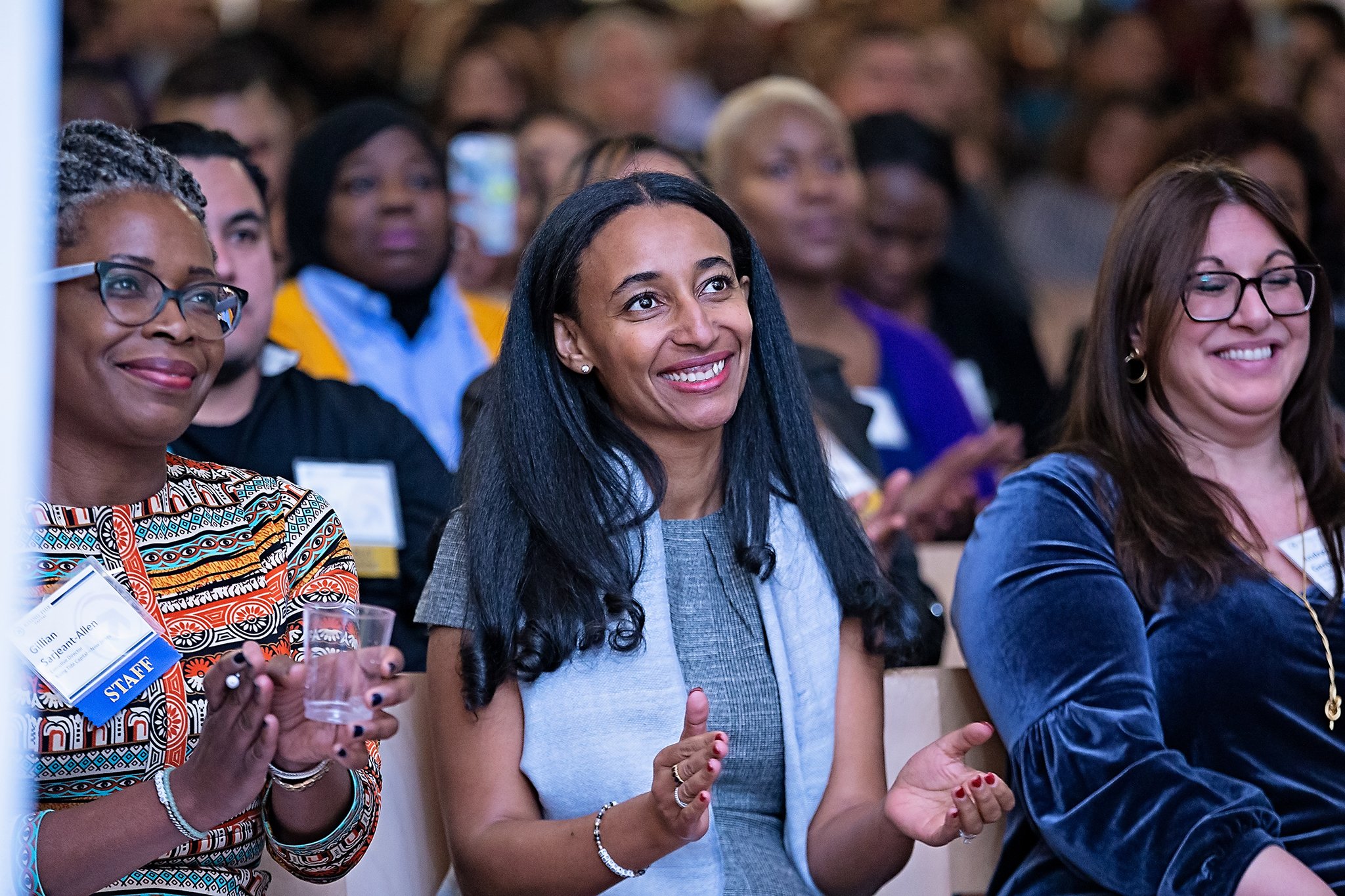
Rising Tide Capital
Enterprise Solutions for the Working Poor
Overview —
ORGANIZATION TYPE
Nonprofit 501(c)(3)
EST.
2004
LOCATION
United States
MISSION
Transform lives and communities through entrepreneurship
IMPACT
Over 1,000 entrepreneurs served annually; 80% business survival rate at 5 years out; on average, participants grow household income by 62% within two years.
Profile —
Rising Tide Capital
The typical participant in Rising Tide Capital’s (RTC) programs is a mom with two kids. She’s employed full time but struggles to make ends meet on around $38,000 a year. Through RTC’s 12-week Community Business Academy, this woman can learn how to turn a personal hobby or talent into an income-generating small business. On average, RTC clients see a 62 percent increase in their household income within two years from these side ventures, reports co-founder Alex Forrester.
Forrester and his wife, Alfa Demmellash, launched the nonprofit while in their early 20s. They were inspired by Demmellash’s entrepreneurial, immigrant mother, who’d fled Ethiopia in the late 1970s during the “Red Terror” under dictator Mengistu Haile Mariam.
In the US, she started a small sewing business—eventually saving enough to both educate her daughter privately in her homeland and then bring her to America at age 12. “Even the humblest of businesses can have an impact that spans generations,” Forrester says. “Our family is living proof.”
He and Demmellash both attended Harvard as undergraduates. Neither majored in business, so when they started Rising Tide Capital, they learned business principles along the way, rather than from a textbook. That experience helped as they wrote the curriculum for the Community Business Academy and their fellow entrepreneurs.
“We had a much better sense of what information would be most practical and helpful,” Forrester says. They could then translate that information in a way that was accessible and tangible for every entrepreneur they assisted— even a mom starting a small business out of her busy home.
The Community Business Academy launched in 2006 with just 15 participants. By 2021, it had graduated 3,500 entrepreneurs. It has now replicated its model through local partners in nine states across the country. RTC offers year-round follow-up to its graduates in the form of one-to-one coaching, connections to industry experts, and help getting financing. On average, RTC works with an entrepreneur for two to three years, and Forrester points to the long-term relationship and support as crucial to the model’s positive impact.
Most RTC clients start a small venture, and 80 percent of those enterprises are still surviving five years later. That clobbers the 50 percent national survival rate for small businesses.
Forrester says that RTC can’t take a lot of credit for that. Instead, he applauds the entrepreneurs’ persistence, creativity, and endurance, as well as the type of ventures they pursue. Even how they define success.
“Many entrepreneurs we work with are starting with very few resources,” he explains. “By necessity, they begin with flexible business models, part-time and home-based. They may have little start-up or fixed costs, and this enables them to flex with the ups and downs of the market.”

“
We know the difference that even the humblest of businesses makes in the lives of families and the children growing up in an entrepreneurial household.
Alex Forrester
Co-Founder | Rising Tide Capital
These entrepreneurs navigate through many obstacles and challenges on their journey, but every small step holds incredible potential. “Eventually, the business may grow into a full-time endeavor,” Forrester says. “In the meantime, it is generating crucial income for the family.”
RTC invests in the business management skills of the entrepreneurs too. “The venture idea will likely change and evolve,” Forrester explains, “but it’s the skills and the investment in the entrepreneur herself that we are focused on.”
RTC is committed to the vision that entrepreneurship plays a powerful role in the context of working poverty. Observers might not initially see the benefit of supporting such small-scale efforts—their initial size and growth curves appear too modest to make a difference.
“The counter-cultural message that we’ve been trying to lift up,” Forrester says, “is that we shouldn’t apply the same evaluatory logic of size, scale, and speed to these ventures that is typically used in the commercial world.
“If you look at what that small enterprise means to a family navigating the challenges of financial insecurity and instability, the extra $500 a month it brings in can be absolutely life-changing.”
RTC has invested significantly in its ability to track the impact of its work, including longitudinal analysis of key metrics: number of businesses and jobs created, business revenue, and household income. Its track record is impressive: serving about 1,000 entrepreneurs annually across several training sites in New Jersey and helping them more than double their sales revenue within two years.
Those businesses also have positive ripple effects in their communities. In 2019, for example, program graduates started 97 new businesses, strengthened 398 businesses, and expanded 305 businesses, leading to the creation of 219 new jobs.
Yet RTC’s vision goes beyond even these short-term indicators, because “businesses and jobs come and go,” says Forrester. Instead, he looks at the impact on the extended social networks of those whose businesses are generating economic opportunity and increased financial security. That’s RTC’s longest lasting and most important influence.
“Entrepreneurs are change-agents and grassroots leaders in their neighborhoods,” he says. “And in their families. We know the difference that even the humblest of businesses makes in the lives of families and the children growing up in an entrepreneurial household.”

“
To heal our fragmented and isolated communities, we need to be proximate to one another—both in our challenges and in the creativity we pursue to solve them.
Alex Forrester
Co-Founder | Rising Tide Capital
RTC points to graduates who have gone on to start new community-serving nonprofits or win election to local public offices. “The social good that these entrepreneurs can do in their communities is directly related, we think, to the amount of affirmation and support they receive in their journeys,” Forrester says. “Our goal is to come alongside them and put our shoulders behind them and the vision they are pursuing.”
“That’s our way of pouring love out into the world in concrete form.”
Proximity and relationship are the guiding principles underlying RTC’s work, Forrester says. The key is “coming into true relationship and forming a community of support.” For example, RTC only hires instructors for its academy who are current or former small business owners. And RTC hosts its classes directly in the communities it serves. “We started on Martin Luther King Drive in Jersey City 18 years ago, and we are still there today.”
“Capital” is also a crucial word in RTC’s model—not only access to financial capital but an investment in human capital, in knowledge, and in social capital. “At the very beginning of RTC,” Demmellash explains, “we emphasized financial capital by operating a loan fund. But within a couple years we saw that what was really needed was a complementary infrastructure of support for the entrepreneurs themselves: education, business management, connections with others.”
Some of those connections are with entrepreneurs from different life contexts. While RTC reserves 80 percent of the seats in its academy for low- to moderate-income individuals, the other 20 percent are open to anyone, Forrester says. “People with MBAs can join and find themselves sitting next to a single parent or someone just returned from the criminal justice system. And with our experiential education methodology, everyone is challenged by the curriculum—it’s a level playing field.”
This mingling, RTC hopes, will foster relationships across socioeconomic divides. “To heal our fragmented and isolated communities, we need to be proximate to one another—both in our challenges and in the creativity we pursue to solve them.”



